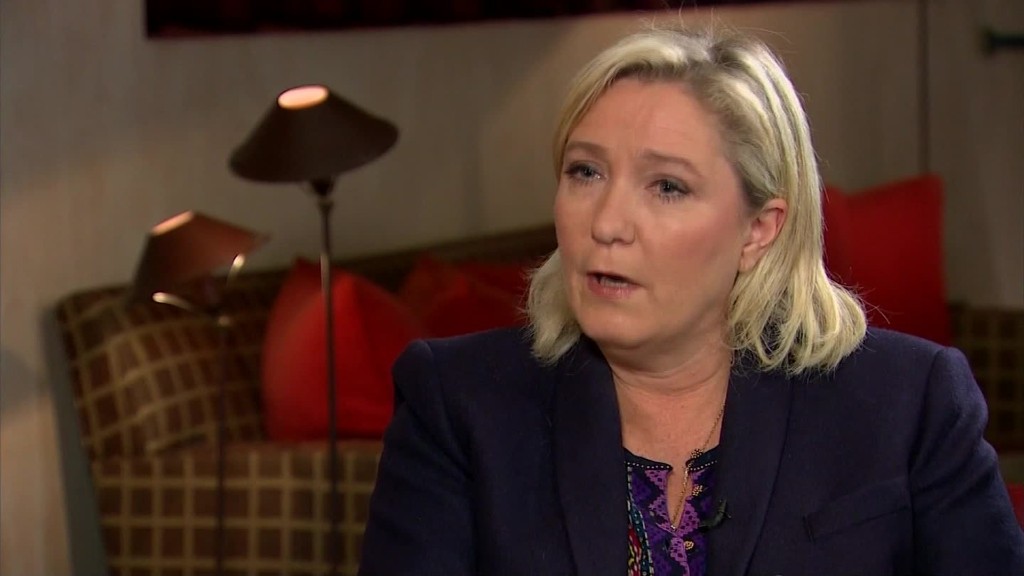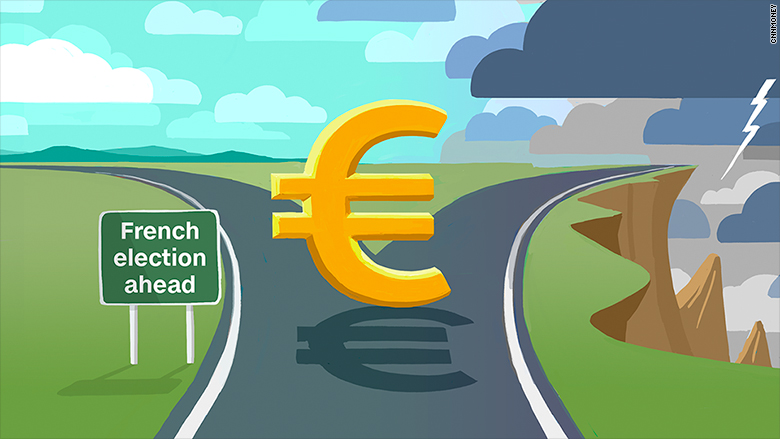
The French election is a battle between two very different economic visions with huge implications for Europe.
Marine Le Pen and Emmanuel Macron, the leading candidates for president, presented that stark choice during the first televised campaign debate on Monday.
Le Pen, of the far-right National Front party, wants France to dump the euro and protect French jobs. Macron, a former French economy minister and banker, is a champion of open borders and closer European integration.
Here's where they stand on the big issues of Europe, trade and taxes:
The euro or new franc?
Le Pen wants to hold a referendum on France's membership in the European Union.
She's proposed dropping the euro and switching to a "nouveau franc" of a lower value to help make French exports more competitive. Existing national debt would be converted to the new currency -- a move likely to be considered a default.
"The EU forbids us everything, punishes us, reprimands us -- and the end result is unemployment and poverty," Le Pen said Monday.
Le Pen's position on the euro was attacked in Monday's debate, with rival candidates accusing her of courting economic catastrophe. She responded by accusing her critics of fear mongering.
Macron couldn't be further away from Le Pen. His campaign is about keeping France at the heart of Europe.
He wants closer integration between the countries that share the euro. He would push for reform of the currency union, and has even called for the eurozone to create its own budget.
Free trade or France first?
Macron is a free trade supporter and campaigned in favor of CETA, the EU's free trade agreement with Canada.
However, he says Europe should tread carefully on new deals, and that Europe should not sacrifice its standards on safety, social protection and the environment.
He has also spoken against reinstating borders in Europe and wants more integration within the trading block.
Related: Trump's anti-EU rhetoric could actually help Europe
Le Pen argued Monday that French companies should be given priority when bidding on public contracts, and said that more should be done to protect jobs at home.
"The state must give priority to French companies and not foreign companies," she said. "I'm not here to create jobs for our neighbors."
She plans to do so by giving "Made in France" products a special label to boost their desirability. If a company moves jobs from France to a country with lower labor costs, its products would be subject to an import tax.
Le Pen's party refuses to support new free trade deals. It has also outlined a range of policies it describes as "intelligent protectionism."

Tax cuts for business or workers?
Le Pen is looking to cut income taxes for the poorest workers, simplify tax rules and fight tax evasion. She's promised a new tax on companies that hire immigrants to encourage them to give jobs to French workers.
Macron has promised to cut corporate tax rates gradually to 25% from 33% at present. He also wants to cut local housing taxes for the majority of French people and reform the wealth tax.
He has pledged to cut public spending by €60 billion ($64 billion) a year, partly by making the government more efficient. He said he would cut up to 120,000 government employees by not filling positions as workers retire.
Related: Dutch voters reject populism but the euro isn't safe yet
Le Pen plans to lower the official retirement age to 60 and encourage companies to hire more people, for example by cutting payroll taxes for businesses.
Macron, meanwhile, would also consider changes to how France's 35-hour work week statute is applied.
"I'm not proposing the far West," he said Monday. "I propose that working hours be negotiated. It's flexibility, it's freedom. We will create employment by giving freedom to companies and having a social dialogue."
Fiscal stimulus or currency devaluation?
Macron has outlined plans for a big economic stimulus which he said will radically transform the French economy.
He wants to spend €50 billion over five years on training, energy and the environment, transportation, health and agriculture.
Le Pen argues her push for an independent France and a devalued currency would give a huge boost to the French economy.
She also promised a "re-industrialization" plan to promote French business and cooperation with the state.
-- Saskya Vandoorne contributed reporting.


